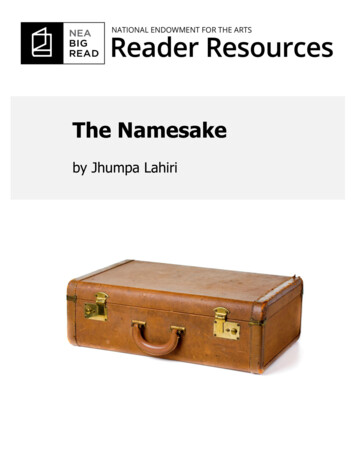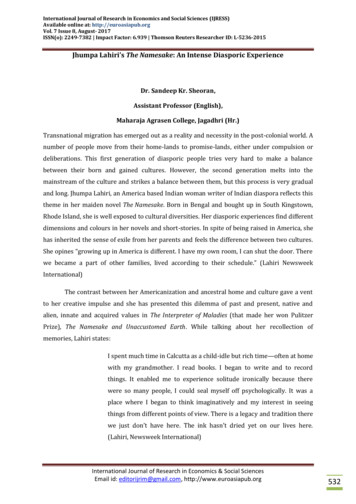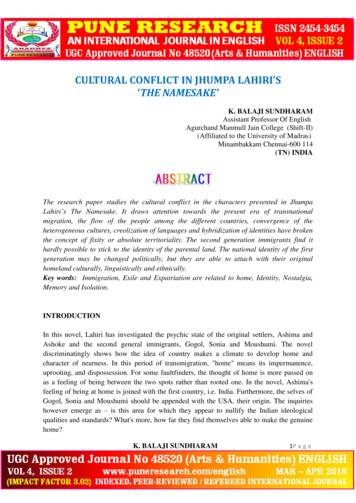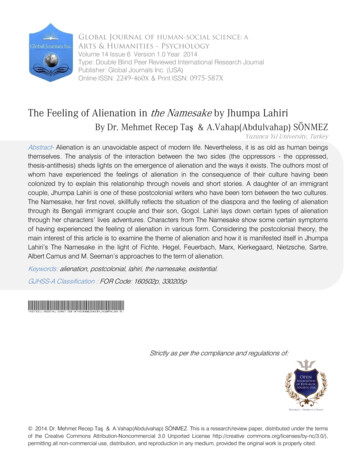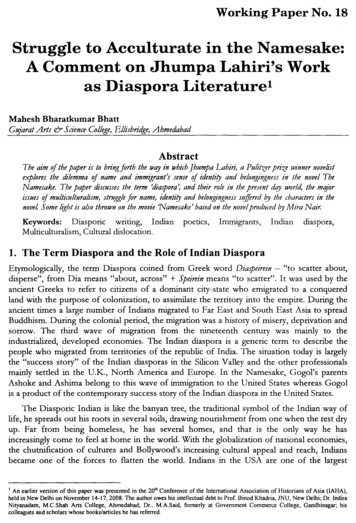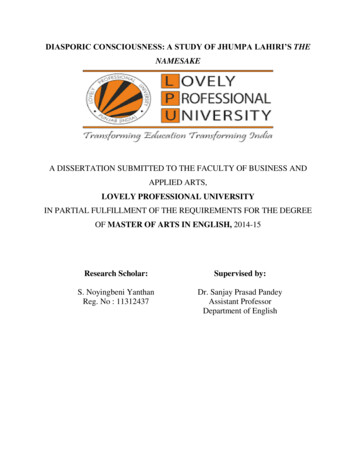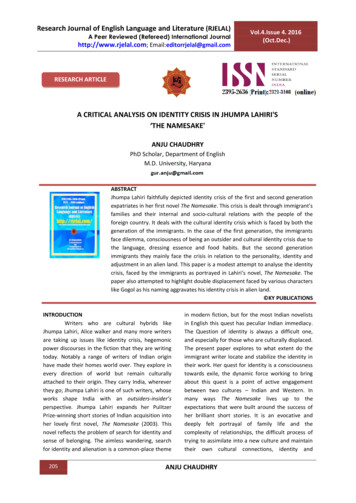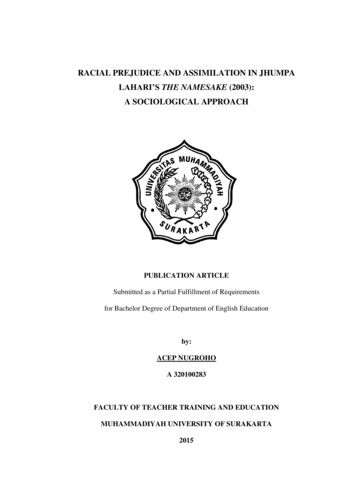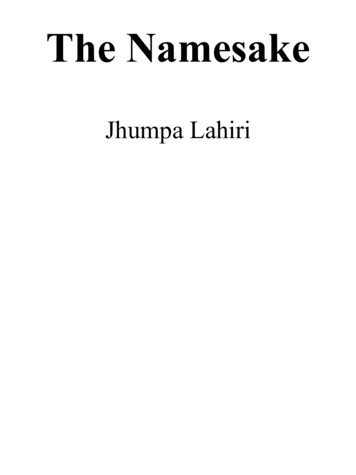
Transcription
The NamesakeJhumpa Lahiri
EXTRAORDINARY PRAISE FORTHE NAMESAKE"Extraordinary . an insightful and descriptive take on family, tradition, andself-acceptance . Jhumpa Lahiri is an accomplished novelist of the firstrank." —San Diego Union-Tribune"Memorable fiction . Lahiri's gift is for shrewd insight into character doneup in elegantly understated prose . Astringent and clear-eyed in thought,vivid in its portraiture, attuned to American particulars and universal yearnings." —Newsday"A moving first novel . Lahiri writes beautifully controlled prose." —SanFrancisco Chronicle"Lahiri's writing is assured and patient, inspiring immediate confidence thatwe are in trustworthy hands. Lahiri beautifully conveys the émigré's disorientation, nostalgia, and yearning for tastes, smells, and customs left behind."—Los Angeles Times Book Review"Poignant . A novel of exquisite and subtle tension, spanning two generations and continents and a plethora of emotional compromises in between .The Namesake is a story of guilt and liberation; it speaks to the universalstruggle to extricate ourselves from the past—from family and obligation andthe curse of history." —Boston Globe"Quietly dazzling . The Namesake is that rare thing: an intimate, closely observed family portrait that effortlessly and discreetly unfolds to disclose a capacious social vision . . . a debut novel that is as assured and eloquent as thework of a longtime master of the craft." —New York Times"This novel powerfully depicts the universal pull of family traditions."—Lifetime
3/295"Lahiri's graceful first novel more than ful.lls the promise of her Pulitzerwinning story collection . The exquisitely detailed saga of the Ganguli family . becomes the classic story of American immigration and assimilation."—Entertainment Weekly"The Namesake . confirms what her first book suggested—that she's a writerof uncommon grace and sympathy."—San Jose Mercury News"Lahiri handles issues of assimilation and belonging with her trademark mixof quiet observation and heartbreaking honesty . the casual beauty of thewriting keeps the pages turning."—Elle"Written in an elegant hush—even upon rereading, there isn't a single burnedraisin in the mix."—New York Times Book Review"This tale of aspiration and double identity is far more authentic and lavishlyimagined than many other young writers' best work." —Time Out New York"Hugely appealing . Gracefully written and filled with wellobserved details,Lahiri's novel—like her hero—manages to bridge two very different societiesand to give us the absolute best of both." —People"Lahiri is an intuitive writer . her gift is a power of sympathy."— The Nation
4/295"This eagerly anticipated debut novel deftly expands on Lahiri's signaturethemes of love, solitude, and cultural disorientation."— Harper's Bazaar"A full flowering of her talent . beautifully rendered . Lahiri displays theknowingness of the native with the newcomer's openness to every detail."—New York"The Namesake does such a remarkable job of depicting the importance offamily and how people cope in unfamiliar terrain that it is one of the bestworks of fiction published this year."—Seattle Times"Achingly artful, Lahiri's first novel showcases her prodigious gifts." —Baltimore Sun"A book to savor, certainly one of the best of the year, and further proof thatthis immensely talented writer's prizewinning ways are far from over."—Atlanta Journal-Constitution"A poignant, beautifully crafted tale of culture shock . Reading it, anyonewill understand how it feels to be a cultural outsider."—Fort Worth Morning Star-Telegram"A fine novel from a superb writer." —Washington Post"Emotionally charged and deeply poignant, Lahiri's tale provides panoramicviews of her characters' lives."—Philadelphia Inquirer
5/295"An enjoyably old-fashioned novel . written in clear, quietly elegant prose .A gifted storyteller, Lahiri has proven her literary mettle." —Raleigh Newsand Observer"The Namesake is a quietly moving first novel . Intensely absorbing . locates the universality in precisely evoked individuality." —ColumbusDispatch"Against all that is irrational and inevitable about life, Lahiri posits the timeless, borderless eloquence and permanence of great writing." —PittsburghPost-Gazette"Sparingly beautiful prose . Lahiri's novel ultimately dramatizes a commonexperience shared by all people: the search for identity." —Fort LauderdaleSun-Sentinel"[Lahiri's] simple, understated prose creates an emotional urgency that distinguishes her work from much more cluttered (and less vivid) contemporaryfiction." —Town & Country"Lahiri's multiple gifts for storytelling, character development, and delicatelyprecise imagery result in a rare and wonderful tale." —Orlando Sentinel"Lahiri's style in this novel, as in her short fiction, is graceful and beautiful."—San Antonio Express-News"Readers will find here the same elegant, deceptively simple prose thatgarnered so much praise for her short stories . The result is a seeminglyquiet, almost undramatic novel whose characters and incidents continue toleap freshly to mind weeks after reading it." —Book Page"A powerful and original voice." —Star Tribune
6/295BOOKS BY JHUMPA LAHIRIInterpreter of MaladiesThe NamesakeA MARINER BOOKHOUGHTON MIFFLIN COMPANYBOSTON NEW YORKFirst Mariner Books edition 2004Copyright 2003 by Jhumpa LahiriAll rights reservedFor information about permission to reproduce selectionsfrom this book, write to Permissions, Houghton Mifflin Company,215 Park Avenue South, New York, New York 10003.Visit our Web site: www.houghtonmifflinbooks.com.Library of Congress Cataloging-in-Publication DataLahiri, Jhumpa.The namesake / Jhumpa Lahiri.p. cm.ISBN 0-618-48522-8 (pbk.)ISBN 0-395-92721-81. Young men—Fiction. 2. Massachusetts—Fiction. 3. EastIndian Americans—Fiction. 4. Children of immigrants—Fiction. 5. Assimilation (Sociology)—Fiction. 6. Alienation(Social psychology)—Fiction. 7. Gogol, Nikolai Vasilievich,1809-1852—Appreciation—Fiction. I. Title.ps3562.a3i6n36 2003813'.54—dc2i 2003041718
7/295Book design by Melissa LotfyTypefaces: Janson and SerlioPrinted in the United States of AmericaMP 10 9 8 7 6 5 4 3 2 1A portion of this book appeared in slightly different formin The New Yorker.AcknowledgmentsI wish to thank the John Simon Guggenheim Foundation forits generous support. My deepest thanks also go to Susan Choi,Carin Clevidence, Gita Daneshjoo, Samantha Gillison, DaphneKalotay, Cressida Leyshon, Heidi Pitlor, Janet Silver, Eric Simonoff,and Jayne Yaffe Kemp.I am indebted to the following books: Nikolai Gogol, by VladimirNabokov, and Divided Soul: The Life of Gogol, by Henri Troyat.Quotations from "The Overcoat" are from David Magarshack'stranslation.For Alberto and Octavio, whom I call by other namesThe reader should realize himself that it could not have happened otherwise,and that to give him any other name was quite out of the question.—NIKOLAI GOGOL, "The Overcoat"
11968On a sticky august evening two weeks before her due date, Ashima Gangulistands in the kitchen of a Central Square apartment, combining Rice Krispiesand Planters peanuts and chopped red onion in a bowl. She adds salt, lemonjuice, thin slices of green chili pepper, wishing there were mustard oil to pourinto the mix. Ashima has been consuming this concoction throughout herpregnancy, a humble approximation of the snack sold for pennies on Calcuttasidewalks and on railway platforms throughout India, spilling from newspaper cones. Even now that there is barely space inside her, it is the one thingshe craves. Tasting from a cupped palm, she frowns; as usual, there'ssomething missing. She stares blankly at the pegboard behind the countertopwhere her cooking utensils hang, all slightly coated with grease. She wipessweat from her face with the free end of her sari. Her swollen feet acheagainst speckled gray linoleum. Her pelvis aches from the baby's weight. Sheopens a cupboard, the shelves lined with a grimy yellow-and-whitecheckered paper she's been meaning to replace, and reaches for anotheronion, frowning again as she pulls at its crisp magenta skin. A curiouswarmth floods her abdomen, followed by a tightening so severe she doublesover, gasping without sound, dropping the onion with a thud on the floor.The sensation passes, only to be followed by a more enduring spasm ofdiscomfort. In the bathroom she discovers, on her underpants, a solid streakof brownish blood. She calls out to her husband, Ashoke, a doctoral candidate in electrical engineering at MIT, who is studying in the bedroom. Heleans over a card table; the edge of their bed, two twin mattresses pushed together under a red and purple batik spread, serves as his chair. When she callsout to Ashoke, she doesn't say his name. Ashima never thinks of her
9/295husband's name when she thinks of her husband, even though she knows perfectly well what it is. She has adopted his surname but refuses, for propriety'ssake, to utter his first. It's not the type of thing Bengali wives do. Like a kissor caress in a Hindi movie, a husband's name is something intimate and therefore unspoken, cleverly patched over. And so, instead of saying Ashoke'sname, she utters the interrogative that has come to replace it, which translatesroughly as "Are you listening to me?"At dawn a taxi is called to ferry them through deserted Cambridge streets, upMassachusetts Avenue and past Harvard Yard, to Mount Auburn Hospital.Ashima registers, answering questions about the frequency and duration ofthe contractions, as Ashoke fills out the forms. She is seated in a wheelchairand pushed through the shining, brightly lit corridors, whisked into an elevator more spacious than her kitchen. On the maternity floor she is assigned to abed by a window, in a room at the end of the hall. She is asked to remove herMurshidabad silk sari in favor of a flowered cotton gown that, to her mildembarrassment, only reaches her knees. A nurse offers to fold up the sari but,exasperated by the six slippery yards, ends up stuffing the material intoAshima's slate blue suitcase. Her obstetrician, Dr. Ashley, gauntly handsomein a Lord Mountbatten sort of way, with fine sand-colored hair swept backfrom his temples, arrives to examine her progress. The baby's head is in theproper position, has already begun its descent. She is told that she is still inearly labor, three centimeters dilated, beginning to efface. "What does itmean, dilated?" she asks, and Dr. Ashley holds up two fingers side by side,then draws them apart, explaining the unimaginable thing her body must doin order for the baby to pass. The process will take some time, Dr. Ashleytells her; given that this is her first pregnancy, labor can take twenty-fourhours, sometimes more. She searches for Ashoke's face, but he has steppedbehind the curtain the doctor has drawn. "I'll be back," Ashoke says to her in
10/295Bengali, and then a nurse adds: "Don't you worry, Mr. Ganguli. She's got along ways to go. We can take over from here."Now she is alone, cut off by curtains from the three other women in theroom. One woman's name, she gathers from bits of conversation, is Beverly.Another is Lois. Carol lies to her left. "Goddamnit, goddamn you, this ishell," she hears one of them say. And then a man's voice: "I love you, sweetheart." Words Ashima has neither heard nor expects to hear from her ownhusband; this is not how they are. It is the first time in her life she has sleptalone, surrounded by strangers; all her life she has slept either in a room withher parents, or with Ashoke at her side. She wishes the curtains were open, sothat she could talk to the American women. Perhaps one of them has givenbirth before, can tell her what to expect. But she has gathered that Americans,in spite of their public declarations of affection, in spite of their miniskirtsand bikinis, in spite of their hand-holding on the street and lying on top ofeach other on the Cambridge Common, prefer their privacy. She spreads herfingers over the taut, enormous drum her middle has become, wonderingwhere the baby's feet and hands are at this moment. The child is no longerrestless; for the past few days, apart from the occasional flutter, she has notfelt it punch or kick or press against her ribs. She wonders if she is the onlyIndian person in the hospital, but a gentle twitch from the baby reminds herthat she is, technically speaking, not alone. Ashima thinks it's strange that herchild will be born in a place most people enter either to suffer or to die. Thereis nothing to comfort her in the off-white tiles of the floor, the off-white panels of the ceiling, the white sheets tucked tightly into the bed. In India, shethinks to herself, women go home to their parents to give birth, away fromhusbands and in-laws and household cares, retreating briefly to childhoodwhen the baby arrives.Another contraction begins, more violent than the last. She cries out,pressing her head against the pillow. Her fingers grip the chilly rails of thebed. No one hears her, no nurse rushes to her side. She has been instructed totime the duration of the contractions and so she consults her watch, a bon
11/295voyage gift from her parents, slipped over her wrist the last time she sawthem, amid airport confusion and tears. It wasn't until she was on the plane,flying for the first time in her life on a BOAC VC-10 whose deafening ascenttwenty-six members of her family had watched from the balcony at DumDum Airport, as she was drifting over parts of India she'd never set foot in,and then even farther, outside India itself, that she'd noticed the watch amongthe cavalcade of matrimonial bracelets on both her arms: iron, gold, coral,conch. Now, in addition, she wears a plastic bracelet with a typed labelidentifying her as a patient of the hospital. She keeps the watch face turned tothe inside of her wrist. On the back, surrounded by the words waterproof, antimagnetic, and shock-protected, her married initials, A.G., are inscribed.American seconds tick on top of her pulse point. For half a minute, aband of pain wraps around her stomach, radiating toward her back and shooting down her legs. And then, again, relief. She calculates the Indian time onher hands. The tip of her thumb strikes each rung of the brown ladders etchedonto the backs of her fingers, then stops at the middle of the third: it is nineand a half hours ahead in Calcutta, already evening, half past eight. In the kitchen of her parents' flat on Amherst Street, at this very moment, a servant ispouring after-dinner tea into steaming glasses, arranging Marie biscuits on atray. Her mother, very soon to be a grandmother, is standing at the mirror ofher dressing table, untangling waist-length hair, still more black than gray,with her fingers. Her father hunches over his slanted ink-stained table by thewindow, sketching, smoking, listening to the Voice of America. Her youngerbrother, Rana, studies for a physics exam on the bed. She pictures clearly thegray cement floor of her parents' sitting room, feels its solid chill underfooteven on the hottest days. An enormous black-and-white photograph of herdeceased paternal grandfather looms at one end against the pink plaster wall;opposite, an alcove shielded by clouded panes of glass is stuffed with booksand papers and her father's watercolor tins. For an instant the weight of thebaby vanishes, replaced by the scene that passes before her eyes, only to bereplaced once more by a blue strip of the Charles River, thick green treetops,cars gliding up and down Memorial Drive.
12/295In Cambridge it is eleven in the morning, already lunchtime in thehospital's accelerated day. A tray holding warm apple juice, Jell-O, icecream, and cold baked chicken is brought to her side. Patty, the friendly nursewith the diamond engagement ring and a fringe of reddish hair beneath hercap, tells Ashima to consume only the Jell-O and the apple juice. It's just aswell. Ashima would not have touched the chicken, even if permitted; Americans eat their chicken in its skin, though Ashima has recently found a kindbutcher on Prospect Street willing to pull it off for her. Patty comes to fluffthe pillows, tidy the bed. Dr. Ashley pokes in his head from time to time. "Noneed to worry," he chirps, putting a stethoscope to Ashima's belly, patting herhand, admiring her various bracelets. "Everything is looking perfectly normal. We are expecting a perfectly normal delivery, Mrs. Ganguli."But nothing feels normal to Ashima. For the past eighteen months, eversince she's arrived in Cambridge, nothing has felt normal at all. It's not somuch the pain, which she knows, somehow, she will survive. It's the consequence: motherhood in a foreign land. For it was one thing to be pregnant,to suffer the queasy mornings in bed, the sleepless nights, the dull throbbingin her back, the countless visits to the bathroom. Throughout the experience,in spite of her growing discomfort, she'd been astonished by her body's ability to make life, exactly as her mother and grandmother and all her greatgrandmothers had done. That it was happening so far from home, unmonitored and unobserved by those she loved, had made it more miraculous still.But she is terrified to raise a child in a country where she is related to no one,where she knows so little, where life seems so tentative and spare."How about a little walk? It might do you good," Patty asks when shecomes to clear the lunch tray.Ashima looks up from a tattered copy of Desh magazine that she'dbrought to read on her plane ride to Boston and still cannot bring herself tothrow away. The printed pages of Bengali type, slightly rough to the touch,are a perpetual comfort to her. She's read each of the short stories and poems
13/295and articles a dozen times. There is a pen-and-ink drawing on page eleven byher father, an illustrator for the magazine: a view of the North Calcutta skyline sketched from the roof of their flat one foggy January morning. She hadstood behind her father as he'd drawn it, watching as he crouched over hiseasel, a cigarette dangling from his lips, his shoulders wrapped in a blackKashmiri shawl."Yes, all right," Ashima says.Patty helps Ashima out of bed, tucks her feet one by one into slippers,drapes a second nightgown around her shoulders. "Just think," Patty says asAshima struggles to stand. "In a day or two you'll be half the size." She takesAshima's arm as they step out of the room, into the hallway. After a few feetAshima stops, her legs trembling as another wave of pain surges through herbody. She shakes her head, her eyes filling with tears. "I cannot.""You can. Squeeze my hand. Squeeze as tight as you like."After a minute they continue on, toward the nurses' station. "Hoping for aboy or a girl?" Patty asks."As long as there are ten finger and ten toe," Ashima replies. For theseanatomical details, these particular signs of life, are the ones she has the mostdifficulty picturing when she imagines the baby in her arms.Patty smiles, a little too widely, and suddenly Ashima realizes her error,knows she should have said "fingers" and "toes." This error pains her almostas much as her last contraction. English had been her subject. In Calcutta, before she was married, she was working toward a college degree. She used totutor neighborhood schoolchildren in their homes, on their verandas andbeds, helping them to memorize Tennyson and Wordsworth, to pronouncewords like sign and cough, to understand the difference between Aristotelianand Shakespearean tragedy. But in Bengali, a finger can also mean fingers, atoe toes.
14/295It had been after tutoring one day that Ashima's mother had met her at thedoor, told her to go straight to the bedroom and prepare herself; a man waswaiting to see her. He was the third in as many months. The first had been awidower with four children. The second, a newspaper cartoonist who knewher father, had been hit by a bus in Esplanade and lost his left arm. To hergreat relief they had both rejected her. She was nineteen, in the middle of herstudies, in no rush to be a bride. And so, obediently but without expectation,she had untangled and rebraided her hair, wiped away the kohl that hadsmudged below her eyes, patted some Cuticura powder from a velvet puffonto her skin. The sheer parrot green sari she pleated and tucked into her petticoat had been laid out for her on the bed by her mother. Before entering thesitting room, Ashima had paused in the corridor. She could hear her mothersaying, "She is fond of cooking, and she can knit extremely well. Within aweek she finished this cardigan I am wearing."Ashima smiled, amused by her mother's salesmanship; it had taken herthe better part of a year to finish the cardigan, and still her mother had had todo the sleeves. Glancing at the floor where visitors customarily removed theirslippers, she noticed, beside two sets of chappals, a pair of men's shoes thatwere not like any she'd ever seen on the streets and trams and buses of Calcutta, or even in the windows of Bata. They were brown shoes with blackheels and off-white laces and stitching. There was a band of lentil-sized holesembossed on either side of each shoe, and at the tips was a pretty patternpricked into the leather as if with a needle. Looking more closely, she saw theshoemaker's name written on the insides, in gold lettering that had all butfaded: something and sons, it said. She saw the size, eight and a half, and theinitials U.S.A. And as her mother continued to sing her praises, Ashima, unable to resist a sudden and overwhelming urge, stepped into the shoes at herfeet. Lingering sweat from the owner's feet mingled with hers, causing herheart to race; it was the closest thing she had ever experienced to the touch ofa man. The leather was creased, heavy, and still warm. On the left shoe shehad noticed that one of the crisscrossing laces had missed a hole, and thisoversight set her at ease.
15/295She extracted her feet, entered the room. The man was sitting in a rattanchair, his parents perched on the edge of the twin bed where her brother sleptat night. He was slightly plump, scholarly-looking but still youthful, withblack thick-framed glasses and a sharp, prominent nose. A neatly trimmedmustache connected to a beard that covered only his chin lent him an elegant,vaguely aristocratic air. He wore brown socks and brown trousers and agreen-and-white-striped shirt and was staring glumly at his knees.He did not look up when she appeared. Though she was aware of his gazeas she crossed the room, by the time she managed to steal another look at himhe was once again indifferent, focused on his knees. He cleared his throat asif to speak but then said nothing. Instead it was his father who did the talking,saying that the man had gone to St. Xavier's, and then B.E. College,graduating first-class-first from both institutions. Ashima took her seat andsmoothed the pleats of her sari. She sensed the mother eyeing her with approval. Ashima was five feet four inches, tall for a Bengali woman, ninetynine pounds. Her complexion was on the dark side of fair, but she had beencompared on more than one occasion to the actress Madhabi Mukherjee. Hernails were admirably long, her fingers, like her father's, artistically slim. Theyinquired after her studies and she was asked to recite a few stanzas from "TheDaffodils." The man's family lived in Alipore. The father was a labor officerfor the customs department of a shipping company. "My son has been livingabroad for two years," the man's father said, "earning a Ph.D. in Boston, researching in the field of fiber optics." Ashima had never heard of Boston, orof fiber optics. She was asked whether she was willing to fly on a plane andthen if she was capable of living in a city characterized by severe, snowywinters, alone."Won't he be there?" she'd asked, pointing to the man whose shoes she'dbriefly occupied, but who had yet to say a word to her.It was only after the betrothal that she'd learned his name. One week laterthe invitations were printed, and two weeks after that she was adorned and
16/295adjusted by countless aunts, countless cousins hovering around her. Thesewere her last moments as Ashima Bhaduri, before becoming Ashima Ganguli. Her lips were darkened, her brow and cheeks dotted with sandalwoodpaste, her hair wound up, bound with flowers, held in place by a hundredwire pins that would take an hour to remove once the wedding was finallyover. Her head was draped with scarlet netting. The air was damp, and inspite of the pins Ashima's hair, thickest of all the cousins', would not lie flat.She wore all the necklaces and chokers and bracelets that were destined tolive most of their lives in an extra-large safety deposit box in a bank vault inNew England. At the designated hour she was seated on a piri that her fatherhad decorated, hoisted five feet off the ground, carried out to meet the groom.She had hidden her face with a heart-shaped betel leaf, kept her head bentlow until she had circled him seven times.Eight thousand miles away in Cambridge, she has come to know him. Inthe evenings she cooks for him, hoping to please, with the unrationed, remarkably unblemished sugar, flour, rice, and salt she had written about to hermother in her very first letter home. By now she has learned that her husbandlikes his food on the salty side, that his favorite thing about lamb curry is thepotatoes, and that he likes to finish his dinner with a small final helping ofrice and dal. At night, lying beside her in bed, he listens to her describe theevents of her day: her walks along Massachusetts Avenue, the shops she visits, the Hare Krishnas who pester her with their leaflets, the pistachio icecream cones she treats herself to in Harvard Square. In spite of his meagergraduate student wages he sets aside money to send every few months to hisfather to help put an extension on his parents' house. He is fastidious abouthis clothing; their first argument had been over a sweater she'd shrunk in thewashing machine. As soon as he comes home from the university the firstthing he does is hang up his shirt and trousers, donning a pair of drawstringpajamas and a pullover if it's cold. On Sundays he spends an hour occupiedwith his tins of shoe polishes and his three pairs of shoes, two black and onebrown. The brown ones are the ones he'd been wearing when he'd first cometo see her. The sight of him cross-legged on newspapers spread on the floor,
17/295intently whisking a brush over the leather, always reminds her of her indiscretion in her parents' corridor. It is a moment that shocks her still, and thatshe prefers, in spite of all she tells him at night about the life they now share,to keep to herself.On another floor of the hospital, in a waiting room, Ashoke hunches over aBoston Globe from a month ago, abandoned on a neighboring chair. He readsabout the riots that took place during the Democratic National Convention inChicago and about Dr. Benjamin Spock, the baby doctor, being sentenced totwo years in jail for threatening to counsel draft evaders. The Favre Leubastrapped to his wrist is running six minutes ahead of the large gray-facedclock on the wall. It is four-thirty in the morning. An hour before, Ashokehad been fast asleep, at home, Ashima's side of the bed covered with examshe'd been grading late at night, when the telephone rang. Ashima was fullydilated and being taken to the delivery room, the person on the other end hadsaid. Upon arrival at the hospital he was told that she was pushing, that itcould be any minute now. Any minute. And yet it seemed only the other day,one steel-colored winter's morning when the windows of the house were being pelted with hail, that she had spit out her tea, accusing him of mistakingthe salt for sugar. To prove himself right he had taken a sip of the sweet liquid from her cup, but she had insisted on its bitterness, and poured it downthe sink. That was the first thing that had caused her to suspect, and then thedoctor had confirmed it, and then he would wake to the sounds, every morning when she went to brush her teeth, of her retching. Before he left for theuniversity he would leave a cup of tea by the side of the bed, where she laylistless and silent. Often, returning in the evenings, he would find her still lying there, the tea untouched.He now desperately needs a cup of tea for himself, not having managedto make one before leaving the house. But the machine in the corridor
18/295dispenses only coffee, tepid at best, in paper cups. He takes off his thickrimmed glasses, fitted by a Calcutta optometrist, polishes the lenses with thecotton handkerchief he always keeps in his pocket, A for Ashoke embroideredby his mother in light blue thread. His black hair, normally combed backneatly from his forehead, is disheveled, sections of it on end. He stands andbegins pacing as the other expectant fathers do. So far, the door to the waitingroom has opened twice, and a nurse has announced that one of them has aboy or a girl. There are handshakes all around, pats on the back, before thefather is escorted away. The men wait with cigars, flowers, address books,bottles of champagne. They smoke cigarettes, ashing onto the floor. Ashokeis indifferent to such indulgences. He neither smokes nor drinks alcohol ofany kind. Ashima is the one who keeps all their addresses, in a small notebook she carries in her purse. It has never occurred to him to buy his wifeflowers.He returns to the Globe, still pacing as he reads. A slight limp causesAshoke's right foot to drag almost imperceptibly with each step. Since childhood he has had the habit and the ability to read while walking, holding abook in one hand on his way to school, from room to room in his parents'three-story house in Alipore, and up and down the red clay stairs. Nothingroused him. Nothing distracted him
The Namesake Jhumpa Lahiri. This document was created wi
